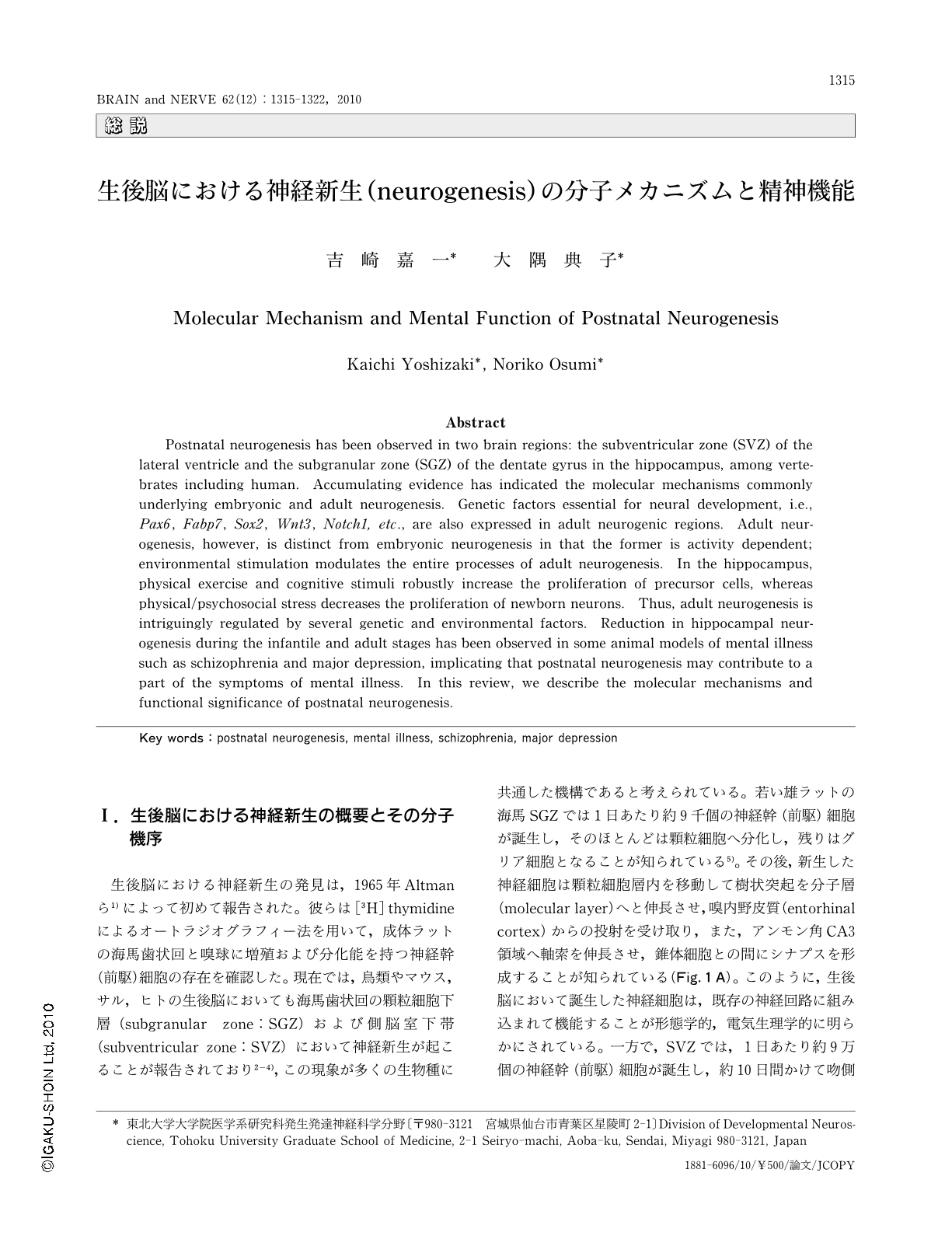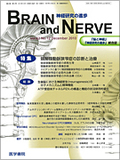Japanese
English
- 有料閲覧
- Abstract 文献概要
- 1ページ目 Look Inside
- 参考文献 Reference
Ⅰ.生後脳における神経新生の概要とその分子機序
生後脳における神経新生の発見は,1965年Altmanら1)によって初めて報告された。彼らは[3H]thymidineによるオートラジオグラフィー法を用いて,成体ラットの海馬歯状回と嗅球に増殖および分化能を持つ神経幹(前駆)細胞の存在を確認した。現在では,鳥類やマウス,サル,ヒトの生後脳においても海馬歯状回の顆粒細胞下層(subgranular zone:SGZ)および側脳室下帯(subventricular zone:SVZ)において神経新生が起こることが報告されており2-4),この現象が多くの生物種に共通した機構であると考えられている。若い雄ラットの海馬SGZでは1日あたり約9千個の神経幹(前駆)細胞が誕生し,そのほとんどは顆粒細胞へ分化し,残りはグリア細胞となることが知られている5)。その後,新生した神経細胞は顆粒細胞層内を移動して樹状突起を分子層(molecular layer)へと伸長させ,嗅内野皮質(entorhinal cortex)からの投射を受け取り,また,アンモン角CA3領域へ軸索を伸長させ,錐体細胞との間にシナプスを形成することが知られている(Fig.1A)。このように,生後脳において誕生した神経細胞は,既存の神経回路に組み込まれて機能することが形態学的,電気生理学的に明らかにされている。一方で,SVZでは,1日あたり約9万個の神経幹(前駆)細胞が誕生し,約10日間かけて吻側移動経路(rostral migratory stream:RMS)と呼ばれる経路に沿って,嗅覚系の1次中枢である嗅球(olfactory bulb)に移動し,顆粒細胞や傍糸球体細胞へと分化することが明らかにされている(Fig.1B)。
これまでの成果から,生後脳における神経新生に関わる分子の多くが,胎生期における神経新生を調節する分子群であることが明らかにされている6)。われわれが注目している転写因子Pax6もまた,胎生期において神経管の脳室帯に強く発現している一方で,生後脳においても,海馬SGZやSVZなどの神経形成領域においてもその発現が認められる7)。また,Pax6ヘテロ接合ラットにおける神経新生の解析結果から,生後脳の海馬SGZにおける神経幹(前駆)細胞の増殖率が野生型ラットと比較して約30%低下しており,特に,神経幹細胞の未分化性維持の破綻によって,早期神経前駆細胞から後期神経前駆細胞へ移行が促進していることが明らかにされている7)(Fig.2)。また,Pax6の標的分子の1つであり,胎生期の終脳の神経上皮細胞に発現することが確認されている脂肪酸結合蛋白7(fatty acid binding protein 7:Fabp7)もまた,生後脳の海馬SGZにおける放射状グリア細胞においてその発現が認められ,Fabp7ノックアウトマウスの解析結果から,生後脳の海馬SGZにおける神経新生が約30%低下することが報告されている8)。このほかに,Sox2やWnt3,Notch1などの胎生期の神経新生に関与する分子もまた,生後脳の神経生成領域においてもその発現が確認されている9,10)。このように,生後脳における神経新生は,胎生期における神経新生と共通した機構によって制御されていると考えられている。
Abstract
Postnatal neurogenesis has been observed in two brain regions: the subventricular zone (SVZ) of the lateral ventricle and the subgranular zone (SGZ) of the dentate gyrus in the hippocampus,among vertebrates including human. Accumulating evidence has indicated the molecular mechanisms commonly underlying embryonic and adult neurogenesis. Genetic factors essential for neural development,i.e.,Pax6,Fabp7,Sox2,Wnt3,Notch1,etc.,are also expressed in adult neurogenic regions. Adult neurogenesis,however,is distinct from embryonic neurogenesis in that the former is activity dependent; environmental stimulation modulates the entire processes of adult neurogenesis. In the hippocampus,physical exercise and cognitive stimuli robustly increase the proliferation of precursor cells,whereas physical/psychosocial stress decreases the proliferation of newborn neurons. Thus,adult neurogenesis is intriguingly regulated by several genetic and environmental factors. Reduction in hippocampal neurogenesis during the infantile and adult stages has been observed in some animal models of mental illness such as schizophrenia and major depression,implicating that postnatal neurogenesis may contribute to a part of the symptoms of mental illness. In this review,we describe the molecular mechanisms and functional significance of postnatal neurogenesis.

Copyright © 2010, Igaku-Shoin Ltd. All rights reserved.


